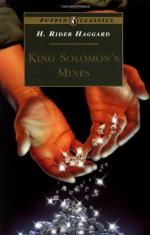“Suddenly, he paused, and seemed to take a resolution. ‘Friend,’ he said, turning towards me, ‘are you there? My eyes grow dark.’
“‘Yes,’ I said; ‘yes, lie down now, and rest.’
“‘Ay,’ he answered, ’I shall rest soon, I have time to rest—all eternity. Listen, I am dying! You have been good to me. I will give you the writing. Perhaps you will get there if you can live to pass the desert, which has killed my poor servant and me.’
“Then he groped in his shirt and brought out what I thought was a Boer tobacco pouch made of the skin of the Swart-vet-pens or sable antelope. It was fastened with a little strip of hide, what we call a rimpi, and this he tried to loose, but could not. He handed it to me. ‘Untie it,’ he said. I did so, and extracted a bit of torn yellow linen on which something was written in rusty letters. Inside this rag was a paper.
“Then he went on feebly, for he was growing weak: ’The paper has all that is on the linen. It took me years to read. Listen: my ancestor, a political refugee from Lisbon, and one of the first Portuguese who landed on these shores, wrote that when he was dying on those mountains which no white foot ever pressed before or since. His name was Jose da Silvestra, and he lived three hundred years ago. His slave, who waited for him on this side of the mountains, found him dead, and brought the writing home to Delagoa. It has been in the family ever since, but none have cared to read it, till at last I did. And I have lost my life over it, but another may succeed, and become the richest man in the world—the richest man in the world. Only give it to no one, senoer; go yourself!’
“Then he began to wander again, and in an hour it was all over.
“God rest him! he died very quietly, and I buried him deep, with big boulders on his breast; so I do not think that the jackals can have dug him up. And then I came away.”
“Ay, but the document?” said Sir Henry, in a tone of deep interest.
“Yes, the document; what was in it?” added the captain.
“Well, gentlemen, if you like I will tell you. I have never showed it to anybody yet except to a drunken old Portuguese trader who translated it for me, and had forgotten all about it by the next morning. The original rag is at my home in Durban, together with poor Dom Jose’s translation, but I have the English rendering in my pocket-book, and a facsimile of the map, if it can be called a map. Here it is.”
[MAP OMITTED]
“I, Jose da Silvestra, who am now dying of hunger in the little cave here no snow is on the north side of the nipple of the southernmost of the two mountains I have named Sheba’s Breasts, write this in the year 1590 with a cleft bone upon a remnant of my raiment, my blood being the ink. If my slave should find it when he comes, and should bring it to Delagoa, let my friend (name illegible) bring the matter to the knowledge of the king, that




